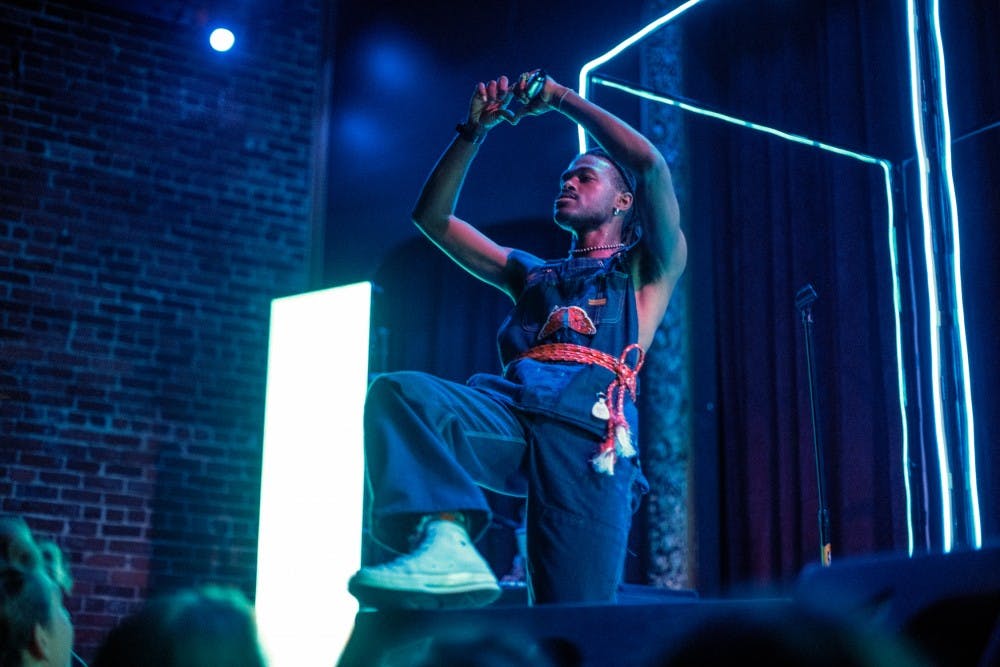Nothing is surface level for Duckwrth.
The LA rapper puts meaning behind everything on wax and everything he leaves on the stage. The rapper’s cadence, energy and drive have together captured international attention and expanded his reach. Projects “I’M UUGLY” and “an XTRA UUGLY Mixtape” have earned the lyricist and funk guru slots on international tours and an Anderson .Paak seal of approval. Many creative routes and Andre 3000 comparisons later, Duckwrth is shining on his solo The Falling Man Tour.
The Spectrum caught up with Duckwrth before Wednesday’s show at the Velvet Underground in Toronto to talk about his musical upbringing, passion for all things Michael Jackson, his studio thought process and push for musical individuality.
Q: You’ve attributed your musical upbringing as the basis for your sound. From looking through your sister’s music collection to hiding under a table during homework hours just to hear your dad’s band practice, you seemed to have the traits of a curious and passionate kid. Would you say this curiosity was a good thing?
A: Definitely. Curiosity usually is. It's like this failed truth that you know is there. It's like you’re doing anything to unveil it. For me with music, it definitely was that. It’s understanding why music made me feel the way it made me feel. I used to write in my diary when my dad was playing in a band and stuff. I was stoked about it. My main thing was trying to figure out why the hell it made me feel that good.
Q: When you started working on your own stuff, I know there was a time when you contemplated giving up on music because it wasn’t taking off as much as it should’ve been. Do you think it’s gotten easier for new artists to gain exposure with streaming taking off as it has?
A: Yeah, it's definitely easier. But the challenge is pressing. … Before it used to take a certain caliber of talent and skill and it didn’t have to be a lot. … If you listen to the songs now, it’s just like anybody can do it. If you’re an A&R, you’re shifting through all this different music. … How do you make yourself heard when there’s all these things from other people who are claiming to be artists?
Q: What do you think your big break was for that?
A: Consistency. And like, being a lot of myself. I feel like a lot of people try to find the popular route. Yeah, it works in a certain way because that’s what’s in demand as far as the rules of supply and demand. In the rules of supply and demand, you supply what’s demanded and you have a better chance of being successful.
Q: Your time has come though, and “Michuul” is doing some pretty big numbers. But this wasn’t your first MJ-inspired track. You have this track “Thrilla” on your Bandcamp from 2012. What’s changed the most for your sound since then?
A: Sharpening my sword. I have a bigger sound pallette. I have a better range. I listen to way more music. … Hip-hop is kind of a simpler performing range of music versus classical. I’m trying to find the most complicated and scale it back. Overall, I’m just trying to find different processes and keep challenging myself and it's definitely starting to make myself better of an artist.
Q: You mentioned classical music. As for your sound, genre influences are scattered throughout –– pop, hip-hop, classical, jazz, rock. Does your music taste ever clash with itself when you’re in the studio, or do you go in knowing what type of record you want to make?
A: I don’t. Sometimes it just depends on the vibe. I would say more times than not I definitely have an idea of what I want to do. But there’s like a good 40 percent of the time where I just go in and be a producer and just talk s--t and just accidentally land on some s--t. I like that process. If you’re too formulaic, then you’re kind of stuck in something. Something could happen that’s amazing but won’t because you’re trying to make a trap banger.
Q: Going back to Michael [Jackson], with his influences, you can see it through your whole vision. Some tracks reminisce some of his funky “Off The Wall” stuff, and parallels can even be made with your visual work. How long has Michael been an influence for you? Do you remember the first time you heard him?
A: Probably since youth. I just wanted to understand what was the makeup of Michael Jackson, I guess. It was just more so I’ve seen the surface level: this amazing pop singer, dancer and just this global icon. You’re kind of taught to love Michael Jackson in a certain way. I guess my whole thing was like ‘OK, he’s definitely talented and he definitely has this persona and everything like that,’ but I wanted to know why. What is it? Even down to his musical arrangement and s--t.
My homie, he has an original studio session of “Smooth Criminal.” He broke down every layer on every stem and s--t. He was just playing a Michael Jackson vocal. Michael Jackson was singing and when he wasn’t singing, he was beatboxing between the singing. And then, the whole time while he was singing, he was dancing and stomping. So you would hear the stomping on the ground and he would leave all that in the song. It’s just like, you would never know unless you actually stripped it down. The reason why his songs make you want to get up or make you want to move is because there’s so much different percussion. It’s coming from his mouth and the production itself and it’s like understanding the magic of something, why you feel it’s magical.
Q: You said you want your music to be the theme song for youth who are going through identity changes. Do you think this is lacking in hip-hop today?
A: Yes and no. I think the narrative remains to be the same in hip-hop in certain ways. But I think people who are making it are looking different. They have different stories. Coming from different ethnicities and backgrounds. Even who they love. [Last Thursday was] coming out day. Steve Lacy already kind of came out. He came out – again – on his Instagram. Being a black singer or guitar player, even the fact of being a black guitar player, that’s just like all division. Being like him and still immersed within black music and for him to come out as bisexual, I don’t think that would’ve been like praised back in the day. ... But I feel like that’s definitely changing a lot. I still hear songs about drugs and guns and stripclubs and s--t like that –– all that surface-level s--t.
Q: You play at the Velvet Underground in Toronto on Wednesday. What do you want your audience to take out of a solo Duckwrth show?
A: That’s a great question. I guess my main goal with creating is pushing a certain sense of individuality. … I guess just have fun. Everything’s got to be too serious in life. We get boggled by bills and relationships. You’re kind of taught as you become an adult you can’t really be a kid. They closed Toys R Us, man, what the f--k. Being a kid is becoming harder and harder, you know?
You can have fun in the real world, it’s just about how you take it in really. I think the world itself, despite all the ills, is still quite beautiful.
Brenton Blanchet is the managing editor and can be reached at Brenton.Blanchet@ubspectrum.com and on Twitter @BrentBlanchSpec

Brenton J. Blanchet is the 2019-20 editor-in-chief of The Spectrum. His work has appeared in Billboard, Clash Magazine, DJBooth, PopCrush, The Face and more. Ask him about Mariah Carey.





